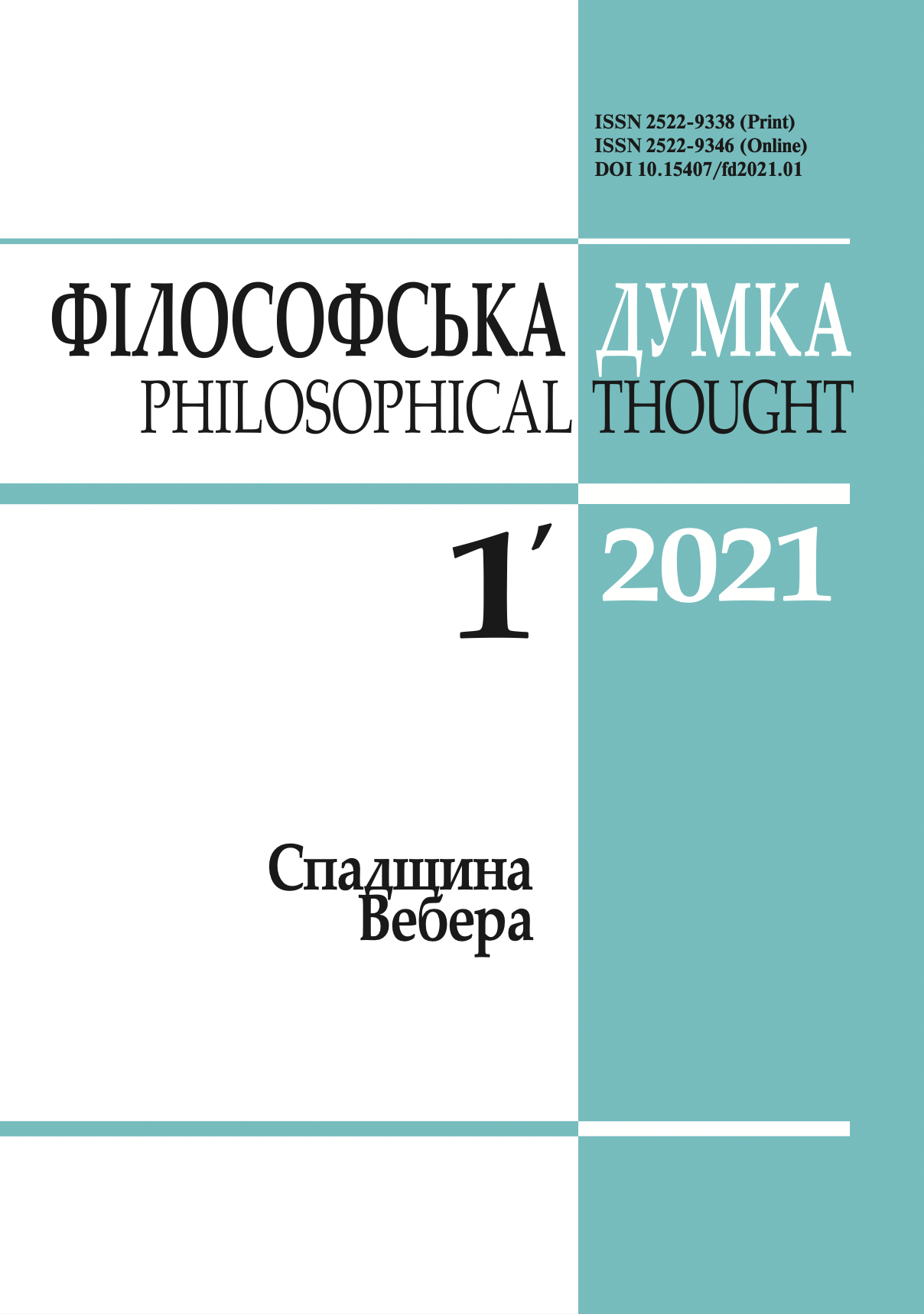Макс Вебер на стику тисячоліть: нове покоління, нові (епістемо)логіки
Спадщина Вебера: на перехресті традицій
DOI:
https://doi.org/10.15407/fd2021.01.057Ключові слова:
Макс Вебер, епістемологія, соціальне, картина світу, розчаклування світу, господарча дія, цінністьАнотація
Статтю присвячено дослідженню позиції Макса Вебера в соціології та філософії і позиції соціології та філософії стосовно Макса Вебера на межі тисячоліть. Автор звертається до низки аспектів теорематики Вебера (гносеологія, аксіологія, онтологія на мікрорівні та на макрорівні), добре відомих і вивчених у соціології, з метою випрацювати та сформулювати цілісну картину концептуальних і методологічних пропозицій Макса Вебера з точки зору їхньої епістемологічної перспективності. Крім того, у статті досліджено упущені на сьогодні можливості концепції та теоретизування М. Вебера, зокрема, в парадоксалізаціі соціологічного та філософського дискурсів, у вивченні господарської дії тощо. Автор із застосуванням широкого спектра аналітик і концепцій західних (Е. Трельч, Ю. Габермас, Ю. Каубе, В. Шлюхтер, С. Кальберґ, Т. Швін, Г. Йоас, І. Фаланд, К. Палонен) і пострадянських (Ю. Давидов, Л. Титаренко, С. Золян, Т. Дмитрієв) соціологів і філософів, а також аналізуючи низку праць самого німецького філософа і соціолога, демонструє евристичний потенціал Веберових розробок у різних вимірах. Заторкнуто теми витоків і коріння Веберової концепції, його методології науки, соціального статусу науки з точки зору М. Вебера, місце розчаклування в соціальних та епістемологічних процесах, співвідношення мотиву та смислу, проблематику розпорядчої влади та корисності, прав людини в оптиці М. Вебера і макроісторичної логіки в його дослідженнях. Також автор звертає увагу на зв’язок соціально-політичної та світоглядної позиції М. Вебера з його гносеологічними розробками, його науковою та академічною діяльністю. Проведено аналогії ситуацій початку ХХ і початку XXI сторіч з демонстрацією можливостей звертання до Веберового досвіду в сучасній соціокультурній та історичній ситуації.
Посилання
Collins, R. (2002). Sociology of philosophies. Global theory of intellectual change. [In Russian]. Novosibirsk: Sibirskii khronograf.
Colliot-Theliene, C. (1998). Des usages de Max Weber. Pensee, 314, 5-14.
Davydov, Yu.N. (1998). Max Weber and modern theoretical sociology: actual problems of Weber's sociological doctrine. [In Russian]. Moscow: Martis.
Deviatko, I.F. (2003). Sociological theories of activity and practical rationality. [In Russian]. Moscow: Avanti-plus.
Gaidenko, P.P., Davydov, Yu.N. (1991). History and rationality. M. Weber's sociology and the Weberian Renaissance. [In Russian]. Moscow: Politizdat.
Golikov, O.S. (2018). Production of the order. Knowledge in the constitution of the social. [In Ukrainain]. Kharkiv: V.N. Karazin KhNU.
Gutorov, V.A. (1999). Max Weber and the socialist tradition. [In Russian]. Zhurnal sotsiologii i antropologii, II (3), 12-17.
Joas, H. (2011). Max Weber and the Origins of Human Rights: A Study of Cultural Innovation. [In Russian]. Zhurnal sotsiologii i sitsialnoi antropologii, 14 (1), 32-50.
Kalberg, S. (1994). Max Weber's Comparative-Historical Sociology. Cambridge: Polity Press.
Kaube, Yu. (2016). Max Weber at the turn of two eras. [In Russian]. Moscow: Dielo.
Lachmann, L.M. (1971). The legacy of Max Weber. Berkeley: Glendessary Press.
Lepsius, M.R. (2004). The originality and potential of the Weberian paradigm [In Russian]. Zhurnal sotsiologii i sitsialnoi antropologii, 7 (2), 51-60.
Lewis, D. (1981). Marxist Critique of Max Weber's Sociological Concepts. [In Russian]. Moscow
Lowy, M. (1998). Weber et Marx, protestantisme et capitalisme. Pensee, 314, 15-23.
Palonen, K. (2010). Objectivity as Fair Play. Weber's redefinition of the normative concept. Policy. [In Russian]. Politicheskie issledovania, 5, 129-145.
Patrushev, A.I. (1992). The unenchanted world of Max Weber. [In Russian]. Moscow: Publishing house of Moscow University.
Rakhmanov, A.B. (2012). Social philosophy of Max Weber. [In Russian]. Moscow: Krasand.
Schluchter, V. (2004). Action, order and culture: the main features of the Weberian research program. [In Russian]. Journal of Sociology and Social Anthropology, 2, 22-50.
Schwinn, Th. (2004). Von der historischen Entstehung zur aktuellen Ausbreitung der Moderne. Max Webers Soziologie im 21. Jahrhundert. Berliner Journal für Soziologie, 4, 527-544.
https://doi.org/10.1007/BF03204596
Symonds, M., Pudsey, J. (2008). The concept of «paradox» in the work of Max Weber. Sociology, 42 (2), 223-241.
https://doi.org/10.1177/0038038507087351
Titarenko, L.G. (2020). Is Max Weber's legacy still relevant today? (to the 100th anniversary of his death). [In Russian]. Journal of the Belarusian State University. Sociology, 2, 54-60.
https://doi.org/10.33581/2521-6821-2020-2-54-60
Toshchenko, Zh.T. (2011). Centaur problem (Experience of philosophical and sociological analysis). [In Russian]. Moscow: Novyi khronograf.
Trölch, E. (1994). Historicism and its problems. The logical problem of the philosophy of history. [In Russian]. Moscow: Yurist.
Vahland, J.V. (1999). Entzauberung. Max Weber und seine Interpreten. Kant-Studien. Meinz, 90 (4), 410-433.
https://doi.org/10.1515/kant.1999.90.4.410
Weber, M. (2005). Economy and society. [In Russian]. Economic Sociology, 6 (10), 46-68.
https://doi.org/10.17323/1726-3247-2005-1-46-68
Weber, M. (1990). Selected works. [In Russian]. Moscow: Progress.
Zolian, S.T. (2018). On the problem of meaning in social semiotics: Max Weber today. [In Russian]. Slovo.ru: Baltiiskii aktsent, 9 (4), 7-42.
##submission.downloads##
-
PDF
Завантажень: 565
Опубліковано
Як цитувати
Номер
Розділ
Ліцензія
Автори, які публікуються у цьому журналі, згодні з наступними умовами:
- Автори зберігають авторське право і надають журналу право першої публікації.
- Автори можуть укладати окремі, додаткові договірні угоди з неексклюзивного поширення опублікованої журналом версії статті (наприклад, розмістити її в інститутському репозиторії або опублікувати її в книзі), з визнанням її первісної публікації в цьому журналі.
- Авторам дозволяється і рекомендується розміщувати їхню роботу в Інтернеті (наприклад, в інституційних сховищах або на їхньому сайті) до і під час процесу подачі, так як це може привести до продуктивних обмінів, а також скорішого і ширшого цитування опублікованих робіт (див. вплив відкритого доступу).


